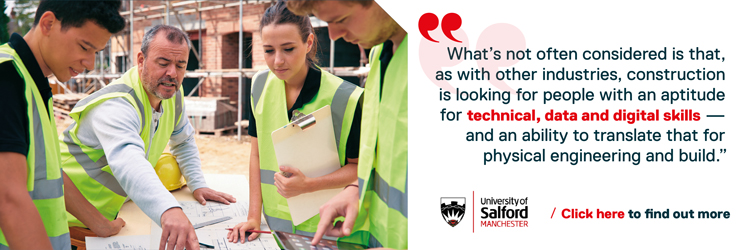
Claire Foreman
Director of Greater Manchester Institute of Technology, University of Salford

Clare Allen
Head, Future of Work, Laing O’Rourke
Higher Technical Skills programmes — produced in partnership with academic institutions and industry players — are a way to deliver innovative training and close skills gaps.
The construction industry is a critical part of the UK economy. Yet, a 2021 report from the Institute for Public Policy Research notes that construction “is facing large and persistent skills gaps and skills shortages” with an estimated 750,000 workers in the sector either retiring — or on the verge of retiring — in the next 15 years. According to figures from the Construction Industry Training Board (CITB), the UK construction industry will need 225,000 new employees by 2027.
To help address this alarming statistic — and ensure there is an expanded curriculum at the higher level of technical education — the Government has created Institutes of Technology: a national network of experienced education providers and leading industry employers, working in close partnerships to deliver first-class technical education and training.
Take the University of Salford — the lead university partner in the Greater Manchester Institute of Technology — which is running Higher Technical Skills programmes in a range of areas, including construction and engineering. Students can study for a Higher National Certificate (HNC), a Higher National Diploma (HND) or a Higher Apprenticeship and have regular contact with industry and employers through visits, guest speakers, live briefs and placement opportunities to gain crucial hands-on experience.
Equipping the workforce of the future with essential skills
Courses are delivered in compact timetables and are a more flexible way of learning. “As such, they are particularly relevant to those already employed within the industry who are thinking about their next step,” says Claire Foreman, Director of Greater Manchester Institute of Technology at the University of Salford. “For example, a joiner looking to progress their career might consider a Higher Apprenticeship in site supervision. The courses can help employers or managers who want to upskill and better plan for the future of their teams.”
The ‘learning by doing’ approach offered by the Higher Technical Skills programmes is key, says Foreman. “Students need to experience real-life projects and hands-on training,” she notes. There are students graduating from universities all over the country who have limited exposure to the workplace. That’s a problem, particularly with the range of new technologies being used in the construction industry, such as digital drone surveying.”
The courses can help employers or managers
Claire Foreman
who want to upskill and better plan
for the future of their teams.
Improving translation of technical, data and digital skills
One of the University of Salford’s programme partners is engineering and construction company Laing O’Rourke, which is providing advice and guidance on the design and delivery of the courses. Clare Allen, Head of Future Work at the company, agrees that a blend of digital and physical skills is vital for the sector’s future.
“The construction sector often has difficulties attracting new talent due to misconceptions that the work lacks variety, is physically demanding and unsafe,” she admits. “What’s not often considered is that, as with other industries, construction is looking for people with an aptitude for technical, data and digital skills — and an ability to translate that for physical engineering and build.”
Working together on the design and delivery of courses
For instance, the team at Laing O’Rourke’s Nottinghamshire-based offsite manufacturing facility works in a controlled manufacturing environment, taking information from digital models to produce high quality products that are transported for assembly on complex but vital building projects all over the UK. “We’ve moved many of the trades traditionally done outside in all weathers into a modern factory environment, making construction delivery roles more accessible and appealing to a wider range of people,” says Allen.
Greater collaboration between universities and industry will ensure that, going forward, the UK construction workforce is equipped with the skills the sector actually requires. That’s good for the industry as a whole — and it’s good for those who work in it. “Ours is a fast-moving sector,” says Allen. “Working closely together enables us to support learners in developing the skills that they need to succeed in their chosen careers.”



